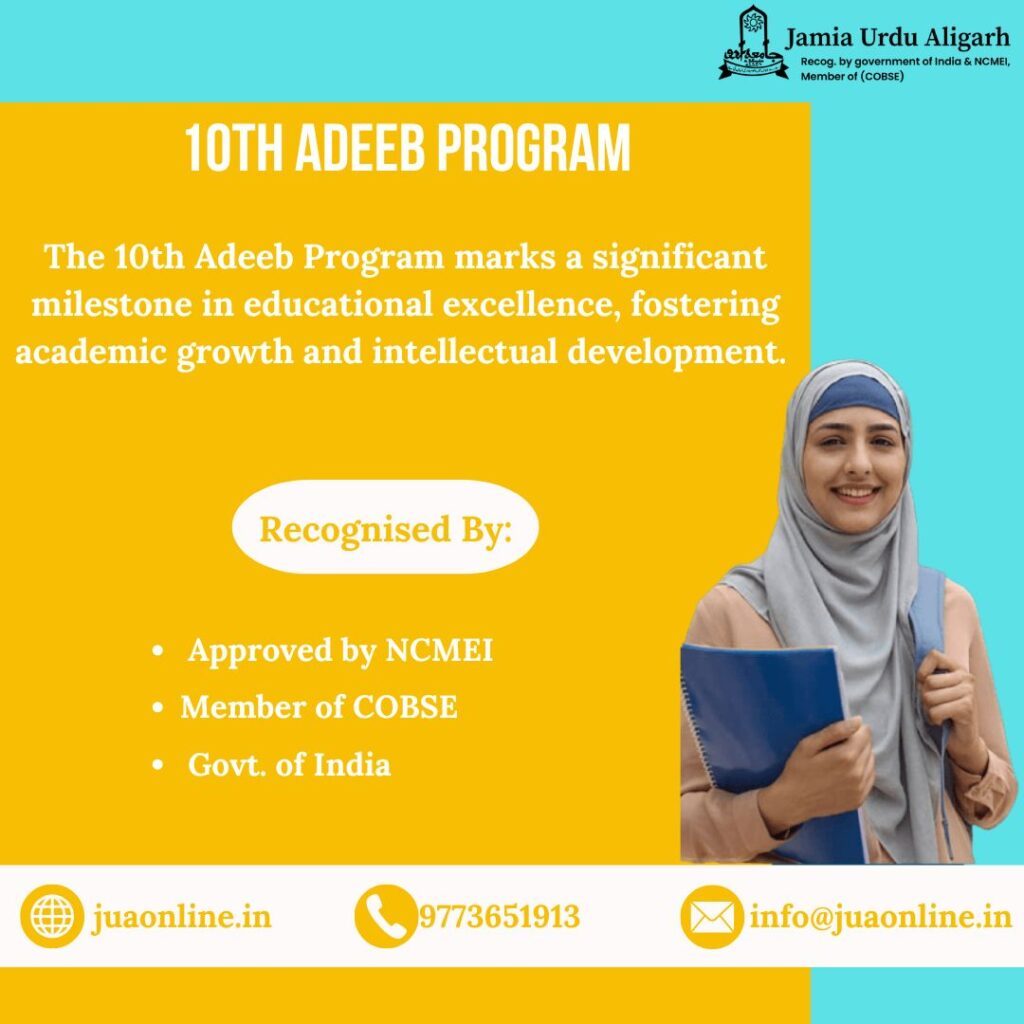Education plays a crucial role in shaping an individual’s future, and acquiring recognized qualifications is essential for career growth. In India, many students who cannot pursue traditional schooling opt for alternative education programs to complete their 10th and 12th-grade certifications. One such program is the 10th Adeeb Program, primarily associated with Jamia Urdu Aligarh. However, there have been multiple discussions and controversies regarding the legitimacy of this institution. In this article, we will explore the 10th Adeeb Program and the allegations labeling Jamia Urdu Aligarh as a fake board.
What is the 10th Adeeb Program?
The 10th Adeeb Program is a certification course provided by Jamia Urdu Aligarh. It is designed to offer Urdu-medium students an opportunity to complete their secondary education. The term “Adeeb” signifies someone proficient in Urdu literature, and this program primarily caters to individuals who wish to pursue further studies or seek employment in Urdu-related fields.
Key Features of the 10th Adeeb Program:
- Designed for Urdu-medium students who could not complete formal schooling.
- Helps in obtaining equivalency for 10th-grade education.
- Recognized in some sectors for educational and employment purposes.
- Conducted by Jamia Urdu Aligarh, an institution that claims to be dedicated to the promotion of Urdu language and education.
While this program has provided many students with an opportunity to complete their education, questions have been raised about the validity and recognition of the certification issued.
The Controversy Surrounding Jamia Urdu Aligarh
Despite its historical significance and contribution to Urdu education, Jamia Urdu Aligarh has been accused of operating as a fake board by various sources. These allegations revolve around the recognition of the institution’s certificates and their validity for government jobs and higher education.
Allegations and Issues:
- Lack of Government Recognition:
- The most serious allegation is that Jamia Urdu Aligarh is not officially recognized by the Ministry of Education (MoE) or other official educational boards like CBSE or state education boards.
- While it was previously acknowledged by some organizations, its current status remains questionable.
- Confusion Over Equivalency:
- Many students who completed the 10th Adeeb Program found it difficult to use their certificates for higher studies.
- Various universities and boards have refused to recognize the certificate as equivalent to a standard 10th-grade qualification.
- Employment Challenges:
- Government job applications often require certificates from recognized educational boards, and many students from Jamia Urdu Aligarh have faced rejections.
- Private sector employers also hesitate to accept certificates from institutions with uncertain legitimacy.
- Misleading Claims:
- Some agents and educational consultants mislead students by falsely claiming that Jamia Urdu Aligarh’s certificates are widely accepted.
- This has led to legal disputes and frustration among students who realize later that their certification does not hold much value.
Is Jamia Urdu Aligarh a Fake Board?
The authenticity of Jamia Urdu Aligarh Fake Board remains a contentious issue. Some argue that it has historical relevance and has been functioning for decades, providing education to thousands of students. Others highlight that its lack of formal recognition and accreditation make it unreliable as an official educational board.
Factors Supporting Legitimacy:
- Established History: The institution has been in existence for a long time and has contributed to Urdu education in India.
- Cultural and Linguistic Contributions: It has played a role in preserving and promoting the Urdu language.
- Recognition in Some Areas: Some universities and states have accepted its certifications in the past.
Factors Suggesting It’s Not a Recognized Board:
- Not Listed Among Official Boards: The Ministry of Education and other central educational authorities do not officially recognize it as an examination board.
- Limited Acceptance for Higher Education and Jobs: Students often face rejection when applying for further studies or employment.
- Legal Challenges: There have been multiple legal cases against institutions issuing unrecognized certificates.
What Should Students Do?
For students looking to complete their secondary education through alternative means, it is essential to make informed decisions to avoid problems later in their academic and professional careers.
Key Steps to Consider:
- Verify Recognition:
- Always check whether the educational board or institution is recognized by the government.
- Visit the Ministry of Education or National Institute of Open Schooling (NIOS) for legitimate options.
- Consult With Universities and Employers:
- Before enrolling, confirm if universities and employers accept the certification.
- Research past cases where students faced challenges due to unrecognized certificates.
- Explore Other Alternatives:
- Consider NIOS, State Boards, CBSE, or ICSE for valid and recognized secondary education.
- Many distance learning programs offer valid 10th and 12th-grade certifications.
- Beware of False Claims:
- Many agents falsely promote institutions by claiming false equivalency.
- Always cross-check official government websites and legal documents before enrolling.
Conclusion
The 10th Adeeb Program under Jamia Urdu Aligarh has served as a gateway for Urdu-medium students seeking educational qualifications. However, the institution’s lack of clear recognition raises concerns about its validity. While it may hold historical and cultural significance, students must be cautious and verify whether their certificates will be accepted for higher education or employment.To avoid future difficulties, students should prioritize recognized educational boards such as CBSE, State Boards, or NIOS for their secondary education. While Jamia Urdu Aligarh may not be entirely fraudulent, its unclear status and limited acceptance make it a risky choice for academic and career growth.Before enrolling in any educational program, thorough research and verification are crucial to ensure that your efforts and investments in education do not go to waste.












